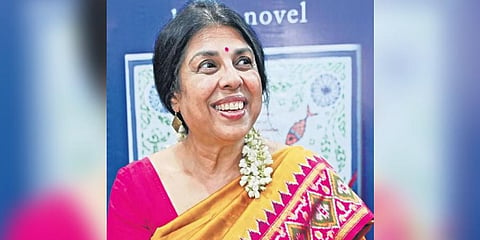

BENGALURU: Set in rural Bengal during one of the defining moments in modern Indian history, author Chitra Banerjee Divakaruni’s latest book Independence (HarperCollins, Rs 499), explores India’s freedom from Britain and the subsequent chaos brought on by partition through the eyes of three sisters. Seamlessly weaving historical accounts with an emotional narrative, Divakaruni gives a fresh perspective on one of the most tumultuous periods in the country’s history.
A Betty and Gene McDavid Professor at the University of Houston’s Creative Writing Program, Divakaruni has been a prolific writer for nearly three decades, examining cultural conflicts, mythological and historical tales through a female perspective, among others. Recently in Bengaluru at Blossoms Book House for the launch of Independence, Divakaruni explained that one of the reasons behind her writing the book was the current political climate in India.
“When I was researching for the book, I saw how people of different communities and ethnic groups came together to become a force that could throw the British. There’s a lesson there. If you want India to be really strong, different communities have to put their differences aside and come together. That’s hope in this book; what happened then can happen again,” she shares, adding that a desire to tell a positive story about India, especially after her previous novel The Last Queen, was also a major factor.
“The Last Queen, set in the 1800s, is about Maharani Jind Kaur, who fought the British really hard, but didn’t win. That was a sad period in Indian history, when all the great kingdoms had fallen, to be taken by the British. I didn’t want to stop there. I wanted to write about India’s triumph, about the period when the British were thrown out and the country became independent,” she explains.
Originally written from a first-person perspective, Independence was extensively reworked just months before publishing to feature a third-person narrative. “The original narrative was too close to each character. I could not give a sense of what was happening in the whole country beyond what they could see. By writing it in third person, I could also talk about what’s going on in India,” says Divakaruni, explaining her reasoning behind the last-minute change.
Through her best-selling novels The Palace of Illusions and The Forest of Enchantments, Divakaruni offered a fresh and nuanced perspective to some of the well-known characters from Indian mythology, often providing voices to the characters, something that was not afforded to them in traditional storytelling.
“Our Indian mythology is so powerful and something that you can read over and over again. I was introduced to these stories by my grandfather. I remember being fascinated especially by the women in these stories when I was growing up. They are strong, multi-faceted and complex. Yet in the traditional telling, they were not given centre-stage. They are talked about, but nothing more than that. Which is why I felt the need to give these women a voice,” she shares.
When she first started writing stories about these women, Divakaruni remembers experiencing ‘a lot of resistance’ from Indian readers. Over time, however, there has been more acceptance toward her work. “When Sister of My Heart – which talks about the killing of female foetuses – was published (first in 1999), it wasn’t received well. But now, things are different. If I bring up an issue, we are able to discuss it. And often, people agree with what I am saying. The country has become more open-minded in some ways. And maybe now, readers are more trusting of my writing too,” she concludes.